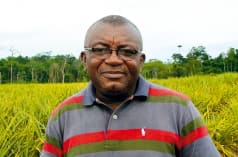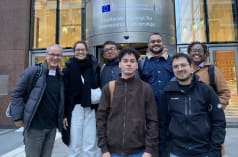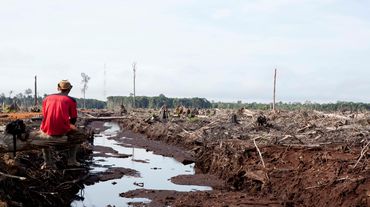The Indonesian delegation
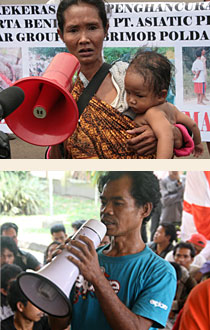
- Ida, Bidin and their son Agung
Ida, Bidin and their son Agung
Indigenous people from Sungai Buayan, Jambi province, Sumatra
The family belongs to the indigenous tribe of the Suku Anak Dalam and is one of 41 families living in Sungai Buayan. The village is located in the middle of a palm oil plantation – its surrounding forest has been cleared in favour of monocultures. For nine years now, the natives are making efforts to reclaim their common land; Bidin leads the negotiations. “We are in possession of a document that clearly attests to the boundaries of our community property; our families have been living in this territory for generations.” In March 2011, the palm oil company Asiatic Persada, a subsidiary of the infamous Wilmar Group, offered the inhabitants of Sungai Buayan compensation; but the indigenous people want the land of their ancestors back.
The family belongs to the indigenous tribe of the Suku Anak Dalam and is one of 41 families living in Sungai Buayan. The village is located in the middle of a palm oil plantation – its surrounding forest has been cleared in favour of monocultures. For nine years now, the natives are making efforts to reclaim their common land; Bidin leads the negotiations. “We are in possession of a document that clearly attests to the boundaries of our community property; our families have been living in this territory for generations.” In March 2011, the palm oil company Asiatic Persada, a subsidiary of the infamous Wilmar Group, offered the inhabitants of Sungai Buayan compensation; but the indigenous people want the land of their ancestors back.
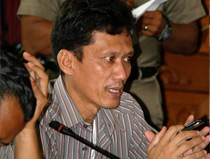
- Muhammad Rusdi
Muhammad Rusdi
Mayor of Karang Mendapo, Jambi province, Sumatra
For ten years, Muhammad Rusdi is fighting against illegal logging, land grabbing and acts of violence by palm oil giant Sinar Mas. As a teenager, he left his village to study. When he came back, the farmers in Karang Mendapo made him their spokesperson; later on, they elected him mayor. Rusdi is the clever mind behind the peasant movement campaigning against the palm oil industry, and he serves as a role model for other communities. That is why the Sinar Mas Group sought to disempower him – and in order to achieve this aim, any means seemed all right.
The Group had Rusdi denounced and put in prison for eight months in 2009. In the course of appeal proceedings, Rusdi was exonerated of all charges against him. He is keeping up the fight for the rights of village communities ever since. Consequently, he appeared before the Indonesian constitutional court and successfully filed a suit against the articles that until then had enabled palm oil plantations to expand in unlawful ways. These articles violated constitutional law and were eliminated from the constitution on September 19th, 2011.
Muhammad Rusdi and the people of Karang Mendapo have achieved a great deal by now: The Sinar Mas Group has withdrawn from the illegally established plantations for the time being. However, the Mayor is still under threat.
Rainforest activists risk their health, their freedom and often their lives. “But without the forest we have no life”, Rusdi says. “That’s why I keep fighting.”
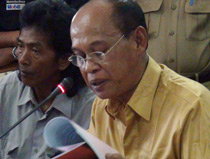
- Zainal Abidin
Zainal Abidin
Lawyer in Jambi, Sumatra
For years, the lawyer is campaigning for the rights of the indigenous people and representing the farmers in their battle against land grabbing and acts of violence by the palm oil industry. Zainal Abidin sees himself as an advocate of the “average people”; in many cases, he receives nothing more than a kilo of rice as payment. He also represents Bidin and Ida against the Wilmar Group, the company responsible for the destruction of their livelihood.
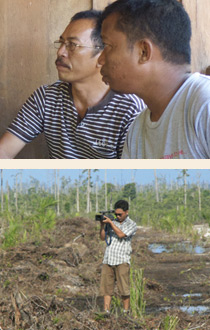
- Nordin (upper picture on the right side) and Safrudin
Nordin and Safrudin
from the NGO Save our Borneo
Nordin is one of the Dayak people, the natives of Borneo. In 2005, he founded the human rights and environmental organisation Save our Borneo, after he had worked for the NGO Walhi for several years. He is still a member of the board of directors of Walhi which is the Indonesian branch of the Friends of the Earth network.
Nordin and his family live in the province of Central Kalimantan of Borneo. There, the palm oil industry has cut down 1.6 million hectares of rainforest for plantations by now – in most instances without official consent of the Ministry of Forestry in Jakarta.
“Collecting and exchanging information are our strongest weapons”, Nordin says. “These are our bulldozers in the face of the bulldozers of the palm oil giants.”
In 2006, Safrudin joined the activists of Save our Borneo who document the crimes of the palm oil industry through photos, videos and GPS, inform the people, take legal action in cases of wrongdoing and corruption and make them public. Nordin and Safrudin drew up the “Action Plan for a Better Life” in the spring of 2011. The intent of this plan is to press charges against Wilmar International, the world’s largest palm oil company, on account of its violation of human rights and crimes against nature. It was Nordin who made Wilmar’s sustainability lie publicly known: The Group received sustainability certificates issued by the Roundtable on Sustainable Palm Oil (RSPO) – although the company illegally cuts down woodland and resorts to massive violence against the population.
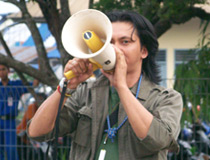
- Feri Irawan
Feri Irawan
from the NGO Perkumpulan Hijau located in Jambi, Sumatra
The farmer’s son from Karang Mendapo built up the organisation committed to battle paper mills, palm oil and timber companies in his home Jambi. Thus, the accomplished land surveyor and engineer became a key figure in the struggle for common law and the population’s forest regions. Feri Irawan grew up in the rainforest; the indigenous people, the Suku Anak Dalam, trust him.
Feri Irawan represents Sumatra on the board of directors of Walhi, and he is a partner of Rainforest Rescue for 12 years. By now, he has started an NGO of his own: Perkumpulan Hijau – which means “green movement”.
The province of Jambi in the heart of the island of Sumatra was the first hot spot for the palm oil industry – only 15 per cent of the forest stand have remained. In order to be able to preserve it and secure the population’s traditional rights, Feri Irawan and his fellow combatants fight for an important cause: At long last, all of the communities in Indonesia need to have maps at their disposal that bindingly keep records of the land they own and that set the seal on these properties by means of a certificate. “If people have documents attesting their ownership of a piece of land that belongs to them by ancient tradition anyway, they are more likely to be successful in defending themselves against illegal land grabbing”, Feri says. Some villages already possess such documents – among them are the indigenous villages located in the area of Jambi that the Wilmar Group claims to own.
